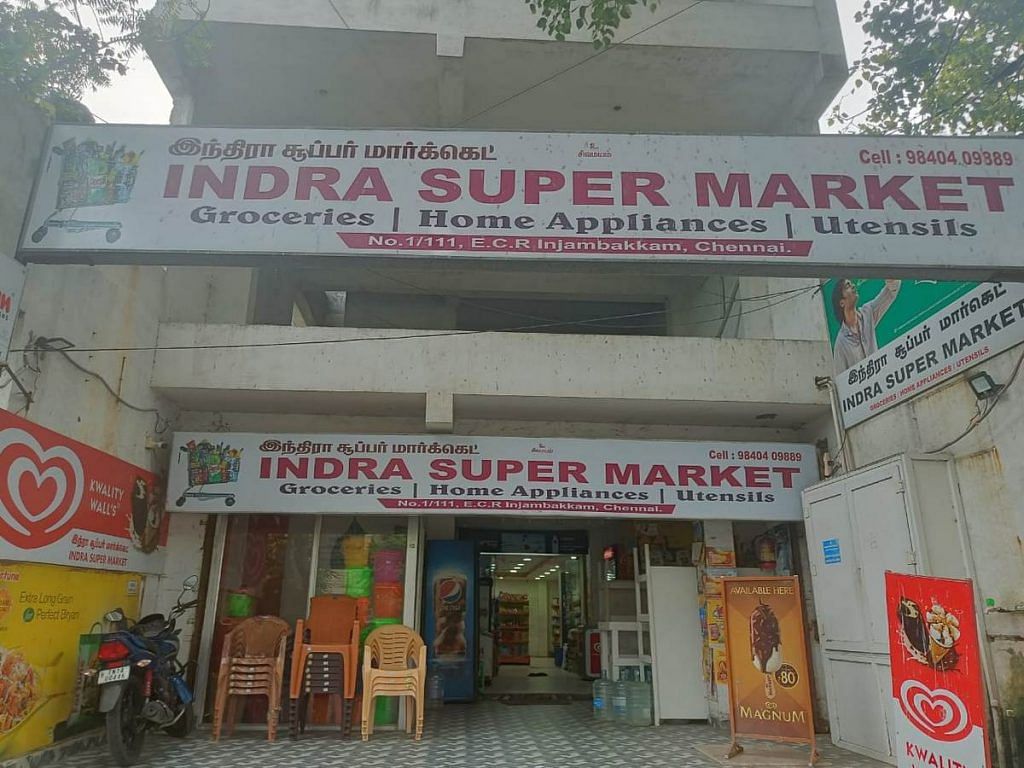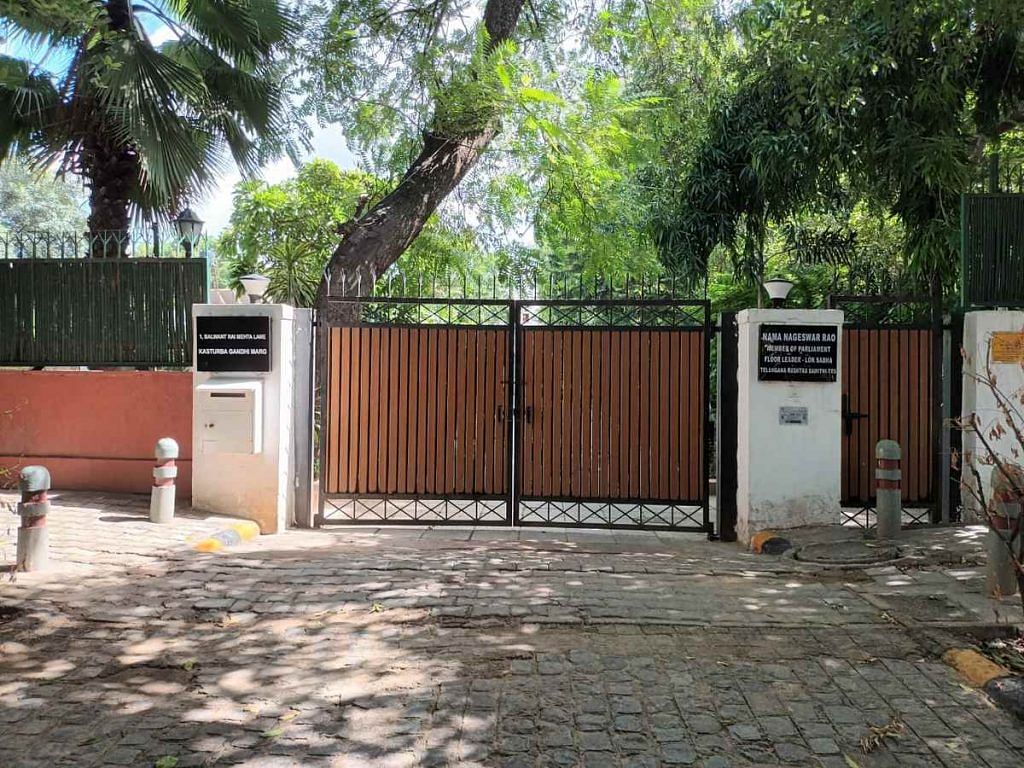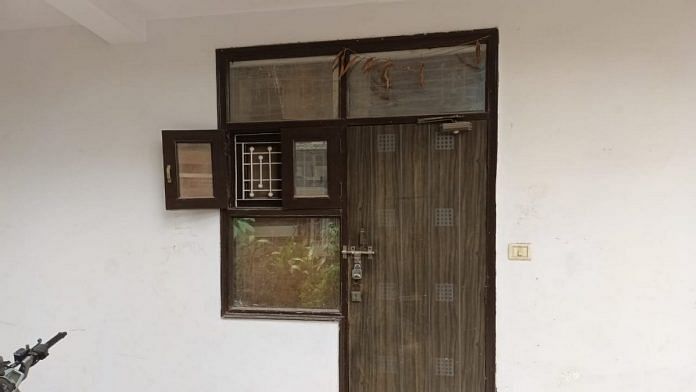New Delhi/Chennai/Mumbai: Tucked away in Chennai’s Injambakkam neighbourhood, Indra Super Market sells groceries, utensils, and home appliances to its customers. But it also happens to be the official address of an unrecognised political party called the Anaithu Makkal Arasiyal Katchi, at least on paper.
According to documents filed with the Election Commission of India (ECI), the shop is the registered office of the political party. “There used to be a party office here till a year and a half ago,” said a salesperson who did not wish to be identified. “I am not sure where they operate from now.”
In south Delhi’s posh Panchsheel Park locality, a four-storey residential bungalow at plot number S-41 is supposed to be the office of Hind Swarajya Ganatantra Party, another unrecognised party. There’s no board or banner outside bearing the party’s name and the guards outside claim they have never heard of it. Visiting the owners, they said, is by prior appointment only.
In Mumbai’s western suburbs, auto-rickshaw drivers who can usually outperform even Google Maps gave up when it came to tracking down one Milan Committee Sewa Sangh building in the Santosh Nagar locality. The building is supposed to be the office of one Bharatiya Awaj Party — one more unrecognised party. No local could confirm that any building by that name existed in the locality at all.
These are just some of the wild goose chases on which ThePrint ended up while trying to trace the official addresses of some “registered unrecognised political parties” (RUPPs) in Chennai, Delhi, and Mumbai over the last week.

Many such outfits (although not necessarily the ones ThePrint tried to track down) are currently under the scanner of the Election Commission and are also being probed by the Income Tax (IT) Department for alleged tax evasion and dubious financial transactions.
An RUPP is essentially a party that has submitted various documents and registered with the ECI — which, according to officials, comes with tax benefits — but have not met the conditions to be “recognised” as a state or national party, which entails winning a certain number of votes or seats in elections contested.
ECI records show that there are currently some 2,796 unrecognised parties registered in India — up from 2,301 in 2019 and only 1,112 in 2010.
The list of recognised parties is far shorter — only 62. Of these, 54 are state parties, among which are Aam Aadmi Party (AAP), Janata Dal-United (JD-U) , Samajwadi Party, Rashtriya Janata Dal, Shiromani Akali Dal, All India Anna Dravida Munnetra Kazhagam (AIADMK), and Dravida Munnetra Kazhagam (DMK). Eight are national parties, which include the Bharatiya Janata Party (BJP), Congress, the Communist Party of India and Communist Party of India-Marxist (CPI-M).
Here’s a look at why many unrecognised parties are on the radar of the ECI and IT Department and how several of them seem to exist only on paper.
Also read: BJP saves Rs 73 cr, Congress to get 27 lakh as govt gives political parties relief on land dues
Why the crack down on unrecognised parties?
The IT Department conducted raids this month in several states as part of a probe against unrecognised parties for alleged tax evasion and murky sources of funding.
Senior officials of the ECI told ThePrint that the election regulator has provided the IT Department with a list of 2,174 unrecognised parties that have not submitted annual financial audit and contribution reports in the past three years.
Since May this year, the ECI has de-listed at least 284 unrecognised political parties for reasons ranging from not contesting elections in several years to not complying with rules such as filing annual contributions and audit reports. The latter, according to ECI officials, is a red flag for “financial impropriety” and “willful tax evasion”.
According to ECI officials, a similar mass delisting of political parties was last conducted in 2016. Before that, it had happened in 2013, 2008, and 2000.
Further, 537 other unrecognised parties are under suspicion for being “inactive” and the list is expanding, ECI officials said. Of the 537 parties, 253 have not contested any election in the past eight years.
So, why is it so concerning if a party registers but then lies low?
Although it is not mandatory to register a political party with the ECI to contest elections in India, there are some benefits to doing so. One of these is being entitled to tax exemptions.
Under Section 29 of the Representation of the People Act (which provides for the registration of political parties with the ECI), all donations received by a political party (recognised or unrecognised) are fully exempted from tax, but parties have to file their contribution/audit reports with the Election Commission annually.
Further, under provisions of the Income Tax Act, an individual can donate any amount to any registered political party and avail 100 per cent tax exemption on the donated amount. However, the quantum of contribution cannot exceed 10 per cent of the donor’s gross annual income.
For instance, individuals with a gross annual income of Rs 10 lakh a year can avail full tax exemption on any amount up to Rs 1 lakh a year donated as contribution to a registered political party — either recognised or unrecognised.
“When registered political parties do not contest polls for a long time, it often leads to suspicion that the tax exemption provisions are being misused. The suspicion heightens when these parties fail in filing annual contribution reports and annual reports. Inspection teams from the state election commissions are then directed to conduct inspection drives,” said a senior ECI official under condition of anonymity.
‘We have nothing to fear’
ThePrint tried to visit the official addresses of 15 unrecognised political parties in Delhi, Chennai and Mumbai over the past one week.
Only two of them could be found in the locations they declared as their official addresses. Coincidentally, both of them turned out to be offices of parties recently delisted by the ECI.
One of them was the Arya Sabha, the political arm of the Arya Samaj and founded by Swami Agnivesh in 1972. It still has an office in Delhi’s Jantar Mantar Road.
“The Arya Sabha contested polls in 1972 and then it merged with the Janata Party in 1977. Since then, the Arya Sabha has not fielded candidates in elections with its own party ticket. As far as being delisted is concerned, we have nothing to fear,” said Vittal Rao Arya, general secretary of the world council of Arya Samaj.
The other office was that of the Rashtriya Dehat Morcha Party, in New Delhi’s Tolstoy Marg.
“We did not contest any elections since we registered as a political party many years ago,” said R.C. Jain, who used to be the general secretary of the party.
According to him, the ECI’s ongoing crackdown is “not surprising”.
“Registering political parties can be a way to do money laundering but we have nothing to fear because we hardly ever receive any contributions. Our records are clean,” he said.
Thirteen other registered addresses for unrecognised political parties were found to be either non-existent or non-functional.
Whereabouts unknown
Aggarwal Chambers is one of the many nondescript buildings in Delhi’s Vikas Marg. The commercial complex houses several chartered accountant offices, computer hardware shops, law firms, a popular shop selling chhole-bhature, and a varied range of business enterprises. Shop number 61 in the building is supposed to be the office of one Hindustani Gareebwadi Party. But no shop by that number exists.
The office of Bharat Mahashakti Party is a closed two-room flat in a middle-income group residential locality in east Delhi’s Priyadarshini Vihar.
One Indian Federal Democratic Party is supposed to have its registered office in Bungalow number 1 at the Balwant Rai Mehta Lane in New Delhi’s Kasturba Gandhi Marg. The only problem: it happens to be the residence of Telangana Rashtra Samithi’s Lok Sabha MP Nama Nageshwar Rao. Staff posted at the MP’s residence said the bungalow never housed the office of any political party.

In Chennai, the All India Samathuva Makhal Katchi does not have its office in the declared location. The same goes for the Janadesh Party in Mumbai’s Kurla Andheri Road.
While Bharatiya Awaj Party, Hindustani Gareebwadi Party, Arya Sabha, Bharat Mahashakti Party, Indian Federal Democratic Party and Rashtriya Dehat Morcha Party are among the unrecognised parties delisted this year, the names of Anaithu Makkal Arasiyal Katchi, Hind Swarajya Ganatantra Party and All India Samathuva Makkal Katchi are still present in the ECI’s list of registered unrecognised parties.
According to lists uploaded on the ECI website, the names of some more political parties which were recently delisted include Bharat Bachao Party of India, Hind Raksha Sena, and Indian Secular Congress registered in Delhi; Anti-Reservation Party of India in Chandigarh; Kranti Dal, Netaji Subhash Party and Vidhayak Dal in Uttar Pradesh; and Labour & Job Seeker’s Party of India in Tamil Nadu.
The names also include Indian Voters Welfare Party in Karnataka; Youth Brigade and Forward Bloc (Socialist) in West Bengal; Kranti Parishad and Lok Paritran in Rajasthan; Shree Bharat Vikas Paksh and Sinh Jan Seva Party in Gujarat; A-Chik National Party in Meghalaya; News Congress and War Veterans Party based in Maharashtra; Hindustan Suraksha Party and United Minorities Front in Assam; Bharat Mangalam Parishad and Garib Vikas Party in Bihar; and more.
How are parties registered
To register a political party, the applicant has to send a request to the ECI through a prescribed proforma. The application must include a printed copy of the party’s draft rules and regulations, chalking out how the proposed party would function, either in the form of a memorandum or a constitution.
Applicants also have to provide bank account details, permanent account number (PAN) details, and a processing fee of Rs 10,000. The party has to have a registered office and disclose its full address and contact details of office bearers in affidavits.
These and other necessary documents must be submitted within 30 days of forming the party.
However, no physical verification takes place at the time of registration, sources at the offices of chief electoral officers in two different states told ThePrint.
“Physical verification drives by district officials are conducted only after complaints are received or any specific party comes under scanner of the election commission,” one of the sources said.
Once registered, all parties remain unrecognised until they succeed in getting a certain number of MPs or MLAs from the states where they are registered, or if they win more than 6 per cent total votes in the latest general or assembly election. If they meet these conditions, they are recognised as state parties. Outfits that get this status in four or more states can apply to be recognised as national parties.
Flaws in the existing system
Despite the reams of documents required for registering with the ECI, the proliferation of unrecognised parties suggests that the system needs to be more stringent.
Former chief election commissioner of India Nasim Zaidi highlighted a number of steps that can help mitigate the problem.
The first is ensuring that physical verification happens at an earlier stage.
“First, when they (political parties) register themselves, there should be a physical verification of their addresses by the concerned district-level election offices instead of relying on declarations. That would solve the problem of non-existent parties to a large extent,” Zaidi told ThePrint.
“Secondly, there should be some sort of a legal requirement for political parties to participate in elections once they are registered or risk getting delisted,” he added.
“Third, there should be stricter supervision of them by the ECI and chief election officers (in states). Fourth, there must be a requirement which ensures that they are able to avail tax exemptions only if they participate in elections. Fifth, the delisting exercise should be made a regular exercise, preferably an annual thing, instead of doing it once in a few years,” said Zaidi, who spearheaded the ECI’s last such mass delisting exercise in 2016.
(Edited by Asavari Singh)
Also read: After EC stick, YSRCP denies making Jagan Reddy lifetime president, ‘it was only our wish’



